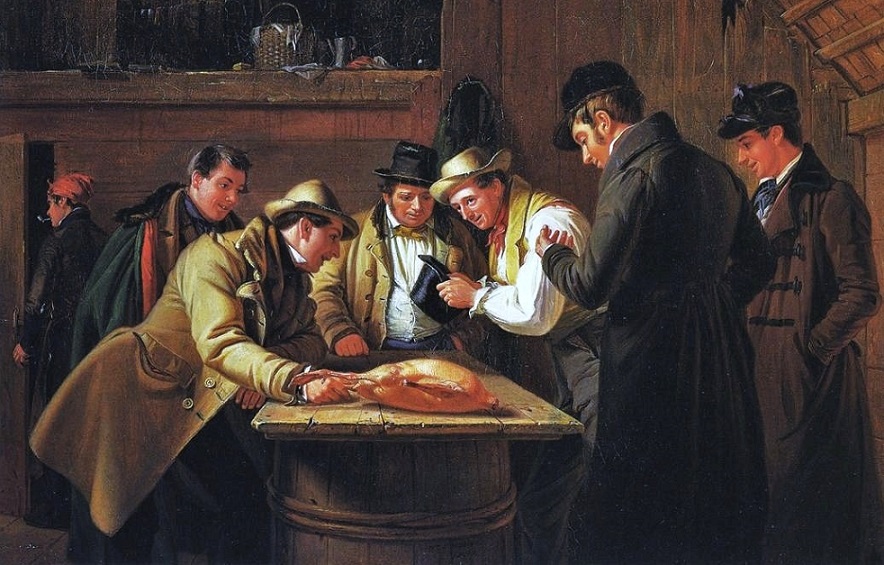Why is it when you’re down and out,
you’re also out of luck?
Success they say is easy,
“you’ll find it in a book.”
I waded through a finance book,
and on the middle page;
Invest like me and you’ll get rich,
no matter what your age.
I searched online, to divine,
a golden block of stock;
A solid name, my company,
was called the Northern Rock.
I studied form, to calculate,
a fortune I could make;
But all too soon a news report
showed profits were a fake.
It said the Rock was short of cash,
and begging cap in hand.
Their savers are withdrawing, oh;
I think I’ll buy some land.
Now on my land I’ll need a cow,
to eat grass and produce.
The cow I bought was guaranteed,
to give a lot of juice.
The local vet inspected her,
she came from way down South;
He said, “she has a very blue tongue,
and also foot and mouth.”
Now with no cow, I’ll make some hay,
and sell it down the road;
The first steep hill, the tractor stalled,
the trailer shed its load.
I feel so low, I need a sleep,
to bolster up my pride.
I dream I’m in the country,
just going for a ride.
The transport was a horse and cart,
and from it I espied,
With flaxen locks, a comely maid;
thinks I, she’ll be my bride.
Sworn love ‘till death, we rode along,
until a brewing storm,
With lightning crashing all around,
a fearful sight that morn.
The horse took off, without the cart,
now diverged from its course;
It overturned, and in a bush,
my arse had found the gorse.
In dreadful pain I sat upright,
and looked round for my bride;
An ancient hag stood over me,
“you can’t sleep here,” she cried.
By now you’ve got the picture;
I haven’t had much luck.
When someone says, “go west young man,”
I’ll send some other schmuck.
Martin John King is a retiree living in Somerset, England.
















Oh, dear! Let’s hope this is your creative imagination at work … and not a synopsis of your life. My favorite part was the ending.
I agree with E.V. (a rhyme!)
The ending was the best!
Thank you both for taking the time to read my rhyme.
The Northern Rock was indeed a very bad investment I made, however over a lifetime I have had many more winners than losers.
The events in a dream were obviously imagined and I hope that you had a laugh.
This poem was very humorous. I enjoyed it.
Loved that poem ‘ no luck’, after a long hard day it made me laugh..very well done.
Brigid, by well done do you mean over-cooked? If not, then I advise you to look into your crock-pot. Don’t be offended, but if you object, then please just excoriate me as a bearer of bad news. I’m used to that. My criticisms, at this point, are almost entirely pro forma.
You say that over a lifetime you have had many more winners than losers. I am happy for your luck in the past, but this was not one of those times. The violations of form, sense, and reason are so manifold that there is not enough space here to enumerate all of them. If you are any good at all, then you will figure the problems out for yourself. I’m sorry, E.V., if I don’t meet your standards, but I am plain worn-out by incondite verse.
Good evening, C. B.! Actually, as I’ve said before, constructive criticisms are fine so long as it’s the verse (not the poet) being critiqued. Furthermore, when these comments include explanations with possible corrections, they become tutorials from which others (myself included) can learn.
Dear C.B,
I welcome your comments although I am unsure of what the violations of “sense and reason” were, given that this was meant to be a self-deprecating and in large part imaginary piece. (I was a farmer for over 30 years and have knowledge of all the disasters which can occur).
I take great pleasure from the kind remarks from those who found it humorous, which is all I intended.
Humour (UK spelling) is sadly lacking in our world today.
The poem is good fun and humorously reflects what we can experience as we move on in hope to the next task. Presently, I am having one of those jinxed periods so its comforting to have company and not take it seriously. Many thanks.
Sending you positive energy so your bad luck spell ends quickly.
Dear E.V. you are very considerate and many thanks. I feel lifted already.
Martin, Hello. Here are eight ways the poem can be improved. 1. The poem alternates between past and present tense. Stanzas 2 through 13 (S2-13) are recounting events from the past, so I would put all of these stanzas in the past tense. 2. In S2, saying “on the middle page” makes it sound like the book is only three pages long. 3. I think the third line of the third stanza (S3L3) would sound slightly better if you invert it so it reads: “My company, a solid name,” 4. In S4L1, I don’t know what “I studied form” means. 5. I recommend you review the rules on punctuation. I don’t have time to list every recommendation I would make on this topic. However, one is that I don’t believe that one capitalizes the first letter of a word that follows a semi-colon, and the poem does that several times. Also, in S13, I would put a period after “bride” and a period after “me.” 6. I would invert S10L3 so that it reads: “A comely maid with flaxen locks.” Also, if she hasn’t been previously married, then she might technically be a maiden, but I’m not sure about that. 7. I would find a true rhyme for S11. When you don’t rhyme the first and third lines of a quatrain, I think it’s important to have a true rhyme in the second and fourth lines. 8. In S12L2, I believe that “diverged” has the emphasis on the second syllable, which throws off your iambic meter. So I would replace “diverge” with “straying” or some other two-syllable word that has trochaic meter.
Here are eight things I like about the poem. 1. The iambic meter is generally strong. 2. The first sentence is an excellent “topic sentence” in that sets the stage for where the poem is going. 3. The poem introduced me to two words I did not know: “espy” and “gorse.” Thank you. 4. I like the consonance of “arse” and “gorse.” 5. S12L4 is funny. 6. S13L3 (When someone says, “go west young man”) is a great line, since it has two alliterations and a consonance. 7. The last line packs a powerful punch. 8. The poem reflects an ability to tell an interesting story in a humorous way. It’s just a matter of refining it in terms of tense, meter and punctuation so that those things don’t detract from the reader’s enjoyment. I look forward to reading your poems in the future.
Hello Mark,
Thank you for taking the time to review the poem. One difficulty I find are the spelling differences and understandings between UK English and USA English.
I am assuming that you are a US resident, but apologise if I am mistaken.
I originally wanted to write “centre page”, but knowing that the common sense US spelling was “center”, I opted for “middle”. A poor choice.
“Studying form” in a financial sense refers to checking the published statistics of a company with regards to asset value, historical and predicted profits, etc.,etc.
The Northern Rock was a building society which had been growing rapidly with borrowed funds, finally suffering a cash crises.
“Maid” is just a girl or young woman in the same era of horse and cart transport.
Thank you again for your advice and support.
I give up. Except for the first half of Mark Stone’s comment, nothing here made much sense. Perhaps I should just get used to it and accept it as part of my penance for past sins. British spellings don’t make a damn bit of difference, since everybody understands exactly what they are, and violations of our common English standards for diction, grammar, & prosody are much more important. Sometimes I am made to feel like a Kindergarten teacher here, and that’s a role with which I am uncomfortable.
Dear Mr. Anderson,
At least Mark Stone was trying to be helpful, whereas you criticise generally without giving specific advice.
It also appears that you do not like comments from readers who have enjoyed the poem.
I rely on the editor to judge whether my poems are worthy to appear on this site, and if this one is as bad as you say it is, then I suggest that you complain to him.
My specific advice is to stop writing poems until you have mastered English grammar. In one of the middle stanzas you wrote:
and from it I espied,
With flaxen locks, a comely maid;
As written, this means that the narrator (you), suddenly equipped with flaxen locks, caught sight of a pretty girl.
Throughout the poem the meter is very irregular, and the whole point of meter is regularity!
I won’t complain to the editor, because he has seen enough of my comments and knows by now my dim view of his leniency.
And I can’t account for the other persons who have already commented, but I would enjoin them to exercise a bit more perspicacity.